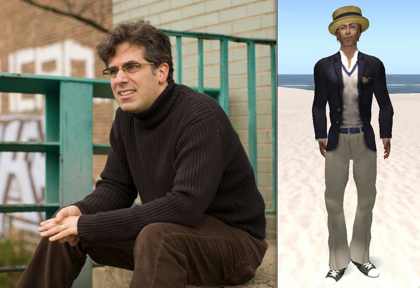Chronic City is a novel about how the real world is becoming more unreal, like a virtual reality, so it’s appropriate that I interviewed its author, Jonathan Lethem, in the virtual-reality world of Second Life.
Lethem described Chronic City as a “very morbid and paranoiac social satire of contemporary life.” It’s set in a near-future Manhattan. “My characters are pretty silly. They’re bohemains and artists in a Manhattan that’s no longer welcoming to artistic types, and they’re dealing with a world that is kind of crumbling around the edges, suspiciously like a badly maintained virtual reality. They’re constantly wondering if they’re living in a simulation. Not only hasn’t anyone informed them, but no one has updated their software anytime recently.”
I interviewed Lethem on my podcast, Copper Robot, which is recorded with a live audience in Second Life. The picture above is Lethem in real life—whatever that is—and his Second Life avatar. The avatar was created by my friend Kim Smith, a.k.a. “Rissa Maidstone” in Second Life. She’s COO of World2Worlds, a consulting company that helps other companies doing business in virtual worlds.
Lethem’s avatar is based on Perkus Tooth, one of the two main characters of Chronic City.
Listen to the complete interview after the jump (unfortunately, the beginning is a little choppy, but I think it’s listenable, and it clears up later):
Chronic City features a fictional virtual world called Yet Another World. “The joke in the name is that everything in this book is a little bit crappier and more degraded than it is even here in our consensual universe, and so Yet Another World is kind of like maybe a poor man’s Second Life,” Lethem said.
“There are two really central characters: The narrator, whose name is Chase Insteadman, and he’s a washed-up former child star who’s living on the residuals of an 80s sitcom that he was famous on. You might think of him as sort of a poor man’s Michael J. Fox. And his new friend in the beginning of the book, who becomes kind of an obsession, and whose obsessions steer the book in all sorts of weird directions, his name is Perkus Tooth. Perkus Tooth is an obsessive paranoiac cultural critic. He had a reputation years ago as a rock writer. He had some stuff in Rolling Stone and Village Voice. But he’s kind of renounced that career, and instead he just spends all his time randomly interpreting cultural stuff.”
 Tooth finds connections between books, movies, newspapers, and even his friends. “It’s all too intense for him, he sees patterns and connections where many other people wouldn’t see them.”
Tooth finds connections between books, movies, newspapers, and even his friends. “It’s all too intense for him, he sees patterns and connections where many other people wouldn’t see them.”
The nature of reality is an ongoing theme of Chronic City. The characters discuss a theory that they might all be living in computer simulation. The “simulation argument” exists in the real world (assuming that we are, indeed, in the real world); it was put forward by Nick Bostrom at the Department of Philosophy at Oxford University.
Lethem explains, “If you believe that virtual realities can be invented, then it’s very likely that we are in one. Because once you can make millions and millions of proliferating simulations, how could the odds be good that you are the original? The odds would be overwhelming that you’re in one of the simulations.”
It’s never cleared up in Chronic City whether the novel is taking place in a computer simulation, parallel universe, or our own universe. I asked Lethem which interpretation was correct.
“I wouldn’t want to clear anything up for you that I’ve painstakingly obscured,” he said. “That would be wasting three-plus years of my life that I’ve spent burying the answer in elaborate ambiguity.”
I asked Lethem if he knows the answer himself, whether the characters are in a virtual world or the real world.
“No, because I’m not certain of it outside the book either. Not certain. No. I have inklings,” he said.
He added, “It seems to me that 21st Century Life for good and for worse has become more virtual, in a lot of different ways.” He said the people who useor live inSecond Life have chosen virtual reality voluntarily. “But I think for a lot of other people who are unwilling or unconscious, their lives have become more virtual anyway.”
Lethem said he doesn’t think the world is “necessarily a digital simulation,” but societal forces, including media, capitalism, and Orwellian political pressures, are making the world more virtual.
“Even if people don’t conceive themselves as interested in computers or virtual reality in any way, they are nonetheless engaged in all sorts of virtual experiences, by doing e-mail, by the sheer fact of working on computers, socializing on computers, joining a really simple social medium like Facebook or shopping in a store like eBay.” People who say they’d never go into Second Life will buy on eBay, which Lethem described as an “imaginary store” where “you compete with other invisible people for objects.”
“News reporting has become overwhelmed by events that are not really there, like the balloon boy, it has this powerful fictional element that just obsesses everyone and takes us out of contact with what might actually matter in the world. I wanted to make it tangible in a way that would be funny, be interesting, be vivid, and capture some of the peculiarities and dislocations that I, personally, experience in this 21st Century,” Lethem said.
Mitch Wagner is a science fiction fan, technology journalist, and Internet marketing consultant. Follow @MitchWagner on Twitter.










